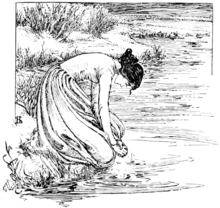But Night sat silent and still. The mother then wrung her hands, wept, and sang. There were many songs sung, but still more tears were shed. Then Night said: "Go to the right, in the gloomy forest of pines, it was thither I saw Death carrying the little child."
In the depths of the wood was a cross way, and she knew not which direction to take. There stood a bramble-bush, without either leaves or flowers, for it was cold winter, and icicles hung to the twigs.
"Have you not seen Death go past with my little child?"
"Yes," said the bramble-bush; "but I will not tell you which way he has taken, until you have warmed me on your bosom. I am freezing here to death, and turning to ice."
And she pressed the bramble-bush close to her breast, in order that it might thaw. And the thorns ran into her flesh, and her blood trickled down in large drops. But the bramble-bush put forth green leaves, and blossomed in the cold winter's night—for warm, indeed, is the heart of
 AND SHE WEPT AND WEPT TILL HER EYES DISSOLVED INTO THE LAKE, AND BECAME TWO COSTLY PEARLS. |
an afflicted mother! And the bramble-bush told her the way she was to go.
She then reached a large lake, where there was neither a ship nor a boat to be seen. The lake was not sufficiently frozen to bear her on its surface, nor yet shallow enough to be waded through—yet over it must she go to find her child. She then lay down to drink up the lake; but that was an impossible task for any mortal to perform. Nevertheless, the sorrowing mother thought that a miracle might perhaps take place.
"No, that will never do," said the lake; let us two rather agree upon a bargain. I love to collect pearls, and your eyes are the purest pearls I have ever seen. If you will cry them away, then will I take you to yonder large hot-house, where Death lives, and rears trees and flowers, every one of which is a mortal's life."
"What would I not give to find my child?" said the weeping mother. And she wept and wept till her eyes dissolved into the lake, and became two costly pearls. Then the lake raised her up as if she sat on a see-saw, and swung her over to the opposite shore, where stood a strange house a mile long. There was no saying whether it was a mountain covered with forests and caverns, or whether it was timbered. But the poor mother could not see, for she had cried her eyes away.
"Where shall I find Death, who took away my little child? " asked she.
"He has not yet arrived here," said a grey old woman, who took care of Death's hot-house. "How have you come hither, and who has helped you?"
"God has helped me," answered she. "He is compassionate; and do you be the same. Where shall I find my little child?"
"I do not know it," said the old woman, "and you can't see. Many flowers and trees withered to-night, and Death will soon come and transplant them. You know that every human being has his tree of life, or his flower of life, according as the case may be. They look like other plants, but their hearts beat. Children's hearts beat likewise. Therefore be guided by that, and perhaps you may recognise the beatings of your child's heart. But what will you give me if I tell you what more you must do?"
"I have nothing to give," said the afflicted mother; "but I would go to the world's end for you."
